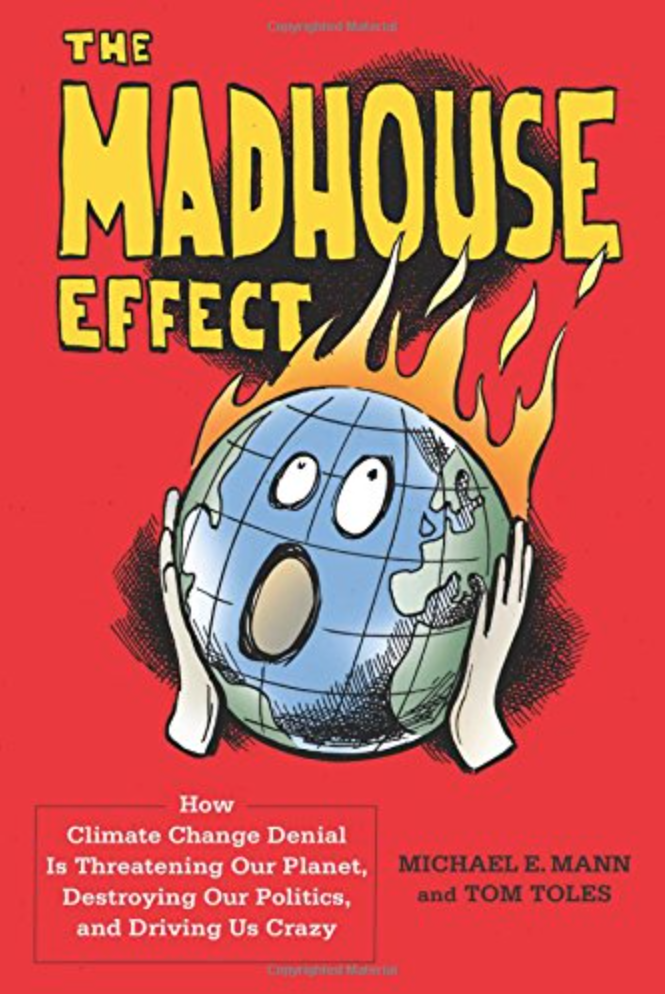My review of Mann and Toles, The Madhouse Effect: How Climate Change Denial is Threatening our Planet, Destroying our Politics, and Driving Us Crazy

The sterling reputations of Michael E. Mann and Tom Toles precede them, and in The Madhouse Effectthey do not disappoint. I confess that I read all the cartoons first (I’m a big Tom Toles fan). Then I dug in to the text, and found it equally enjoyable.
The writing is brilliantly clear and concise. The science is unfailingly accurate. And the cartoons add an immediacy, accessibility, and passion to the book that “normal” books about the climate problem usually lack.
There are many excellent treatments of climate science for lay people, but most talk about climate science without explaining first what science is and what we can reasonably expect of it. Chapter 1, titled “Science: How it Works”, takes on that challenge (see also Chapter 4 in my 2008 book, Turning Numbers into Knowledge: Mastering the Art of Problem Solving, titled “Peer Review and Scientific Discovery”).
Chapter 1 is critically important to understanding what I see as the key purpose of this book. The campaign of denial and deceit against climate science is an attack on rational thinking and scientific inquiry more generally, and this book is a counterattack against that effort for a non-technical audience.
Others have made this case, notably Naomi Oreskes in Merchants of Doubt, and Mann and Toles echo and support Oreskes’ arguments, with additional context and color from Professor Mann’s experience as a practicing climate scientist who has faced down the deniers on more than one occasion (even prevailing in court).
Mann and Toles also don’t shrink from naming names, and this is one of the most important contributions of the work, particularly for practicing journalists. The rogue’s gallery of deniers and delayers is a who’s who of people who journalists shouldn’t cite on this topic (or probably any topic). Their credibility is shot in the scientific community, and they should be treated as the cranks and crackpots that they are.
This assessment sounds harsh, but most of these bad actors have been at this game for decades, and their strategy is one that they’ve used many times before. Here’s how I summarized it in Cold Cash, Cool Climate: Science-based Advice for Ecological Entrepreneurs:
The supporters of the deniers follow a particular strategy, one that was well honed by the corporate responses to various public health and environmental issues, as documented by Naomi Oreskes and others. They make excuses that parallel the high level talking points summarized at Skeptical Science:
It’s not a problem.
If it is a problem, we didn’t cause it.
Even if we caused it, fixing the problem would be too expensive and cost too many jobs.
These are exactly the same points industries used in fighting government action on cigarettes, asbestos, seat belts, air bags, lead in paint and gasoline, catalytic converters, ozone depletion, acid rain, and any number of other related issues, and we need to start treating it as a deliberate strategy instead of just a legitimate line of argument to be analyzed and assessed in isolation. That doesn’t mean industry will never raise real issues about whether and how to regulate a particular environmental problem, just that we should be more than a little skeptical whenever we hear this self-serving way of framing issues. It is especially important for members of the news media to understand this tactic, because they often unwittingly serve as megaphones for industry arguments of this form. If they realized that this strategy is a deliberate one, they might be a bit more careful in how they characterize these stories.
Those of us who’ve been studying climate science and solutions for decades have grown weary of the deniers being treated as serious contributors to the debate. This book makes a strong case for voting them off the island.
The only minor criticism I’d raise of The Madhouse Effect is that the treatment of the economic case for rapid climate mitigation is a bit less strong than I’d prefer, but Professor Mann isn’t an economist or a technologist, so this isn’t really surprising. Perhaps for his next popular treatment he’ll bring in a collaborator to take a more detailed crack at that aspect of the problem!
This is just a quibble, however. It is rare to find a book on a complex topic that is so clearly written, compelling, and (dare I say it?) fun. I loved it, and you will, too.
References
Koomey, Jonathan. 2008. Turning Numbers into Knowledge: Mastering the Art of Problem Solving. 2nd ed. Oakland, CA: Analytics Press.
Koomey, Jonathan G. 2012. Cold Cash, Cool Climate: Science-Based Advice for Ecological Entrepreneurs. Burlingame, CA: Analytics Press.
Mann, Michael E., and Tom Toles. 2016. The Madhouse Effect: How Climate Change Denial is Threatening our Planet, Destroying our Politics, and Driving Us Crazy. New York, NY: Columbia University Press.
Oreskes, Naomi, and Eric M. Conway. 2010. Merchants of Doubt: How a Handful of Scientists Obscured the Truth on Issues from Tobacco Smoke to Global Warming. New York, NY: Bloomsbury Press.
